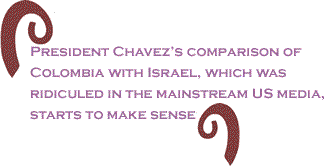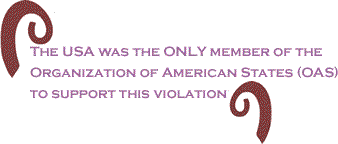Over the last few weeks, a strange set of events
have taken place in both South America and the USA revolving
around Colombia’s attack on bases of the Revolutionary Armed
Forces of Colombia (known by their Spanish acronym “FARC”) in
Ecuador. The facts are rather straight forward. Military units
of Colombia
attacked a FARC base that was NOT in Colombia. In the ensuing attack, they killed a
top commander of the FARC - Raul Reyes - along with more than
20 other people, several of whom were non-combatants. Following
the attack, the Colombians claimed that they had captured a
laptop computer which contained evidence that proved the governments
of Venezuela
and Ecuador
had been assisting the FARC.
At this point, the plot thickened. First, the
governments of Ecuador
and Venezuela
condemned the attack and mobilized their respective militaries
to move to their borders with Colombia. The outcome of this
was and actually is unpredictable.
Second, here in the USA, the Bush administration followed an unsurprising
course of supporting Colombia’s violation of Ecuadorian sovereignty
and international law. In fact, the USA was the ONLY member of the Organization of
American States (OAS) to support this violation. Other Latin
American countries either immediately condemned the Colombian
action or expressed deep reservations as to this initiative.
Also in the USA, the media largely supported
the illegal Colombian attack, but additionally jumped to the
conclusion that the Colombian assertion of Venezuelan and Ecuadorian
support for the FARC was valid. They did so, as on the editorial
page of the Washington Post, without a shred of proof,
very reminiscent of the response to the coup against President
Chavez in 2002, supported by much of the mainstream US media, but based on a distortion of the facts
as to what had actually transpired.

Ultimately the OAS issued a declaration asserting
that the Colombian assault had been a violation of Ecuadorian
sovereignty. This action by the OAS represented a clear slap
at the USA. The OAS declaration,
however, has not seemed to have had any impact on the US media and its attitude toward Colombia’s violation of international
law.
 The
Colombian attack on the FARC base, along with the Colombian
escalation of personal attacks on Venezuelan President Chavez,
are both most odd. President Chavez has over the months been
involved in hostage negotiations with the FARC, trying to secure
the release of prisoners long held. In the beginning, Chavez’s
involvement had the approval of the Colombian government. In
the middle of these negotiations, however, Colombia’s
President Uribe suddenly and inexplicably began a polemic against
President Chavez, throwing around various accusations. While
Chavez was, nevertheless, able to secure some releases, the
timing of Uribe’s tirade was most strange.
The
Colombian attack on the FARC base, along with the Colombian
escalation of personal attacks on Venezuelan President Chavez,
are both most odd. President Chavez has over the months been
involved in hostage negotiations with the FARC, trying to secure
the release of prisoners long held. In the beginning, Chavez’s
involvement had the approval of the Colombian government. In
the middle of these negotiations, however, Colombia’s
President Uribe suddenly and inexplicably began a polemic against
President Chavez, throwing around various accusations. While
Chavez was, nevertheless, able to secure some releases, the
timing of Uribe’s tirade was most strange.
Targeting Raul Reyes was also peculiar. FARC
commander Reyes had been involved in discussions with the French
government concerning the release of hostages, a fact acknowledged
by the French themselves. Additionally, Reyes was the public
face of the FARC and was known largely as a diplomat, attempting
to enter into discussions with various organizations and nations
revolving around the on-going Colombian conflict. Thus, the
killing of Reyes - which was certainly no accident - if anything
ups the ante and makes a peaceful resolution of the conflict
in Colombia less likely.
In this sense, President Chavez’s comparison
of Colombia
with Israel,
which was ridiculed in the mainstream US
media, starts to make sense. At various moments the Israeli
government has undertaken military actions against Palestinian
leaders (almost irrespective of organizational affiliation)
precisely when such groups, including the Islamist group Hamas,
have either declared a truce, a cease-fire, or an openness to
negotiations. The assassination of political leaders of the
Palestinian movement has become a modus operandi of the
Israeli military, thus making a peaceful resolution of the Israeli/Palestinian
conflict that much more difficult, since the situation has been
so inflamed.

In Colombia, the FARC, which
is an organization that descends from peasant militias of the
1960s, carried out a major truce in the late 1980s and early
1990s in which it agreed to engage in peaceful electoral politics.
The political coalition it formed ran candidates for office,
only to have their candidates regularly murdered by right-wing
death squads, often connected directly with the Colombian government.
Eventually the FARC abandoned such electoral activity.
Subsequent truces have been violated by both
sides, and the activities of the FARC have at various occasions
been hideous if not criminal, but the hostage negotiations that
were being conducted by President Chavez seemed to offer a glimmer
for more substantial negotiations. President Chavez’s suggestion
that the FARC not be treated as a terrorist grouping but rather
be treated as a military insurgency, therefore, is not as outlandish
as the US
media attempted to present it. In the context of attempting
to arrive at a peaceful resolution of the hostage situation,
not to mention the larger conflict, it is nearly impossible
to have a meeting of the minds if one side is treated as illegitimate,
irrespective of either one’s attitude toward them or the amount
of territory and people that said group happens to control.
Undermining the hostage negotiations and the killing of the
FARC leader on Ecuadorian territory derails the possibility
for a peaceful resolution and makes the continuation of military
conflict that much more likely. One can deduce that this was
precisely the objective of President Uribe who has repeatedly
suggested that a military resolution to the Colombian conflict
is not only possible but advisable.
 President
Chavez’s paralleling the actions of the Colombians and that
of the Israelis is not a rhetorical device. He is identifying
a practice that flows from President Bush’s polarizing view
of the world: one is either with us (the USA, or its allies) or with
the terrorists; there is no middle ground. Bush has promoted
such approaches and supported governments that, assuming they
are allied with the USA,
take a completely un-compromising view of all insurgencies,
irrespective of the socio-economic or political sources of such
insurgencies. Thus, the Kurdish sovereignty movement in Turkey
has been under vicious repression for years, without so much
as a squirm from the USA.
Instead, the USA
sides with Turkey in blaming the Kurdistan
Workers Party (PKK) as being the source of the problem. The
Philippine government has condemned as terrorist and carried
out repeated military actions against the Communist Party of
the Philippines/New People’s Army, despite the international
recognition that this is a civil war, and despite the CPP/NPA’s
willingness to engage in peaceful negotiations. The Israeli
military strikes against Palestinian leaders and the continuation
of the internationally condemned Occupation all prolong the
Israeli/Palestinian conflict, pressing the Palestinians toward
desperate measures. And now we witness Colombia’s
illegal intrusion into Ecuador,
denounced by the entirety of the OAS, except for the Bush administration.
President
Chavez’s paralleling the actions of the Colombians and that
of the Israelis is not a rhetorical device. He is identifying
a practice that flows from President Bush’s polarizing view
of the world: one is either with us (the USA, or its allies) or with
the terrorists; there is no middle ground. Bush has promoted
such approaches and supported governments that, assuming they
are allied with the USA,
take a completely un-compromising view of all insurgencies,
irrespective of the socio-economic or political sources of such
insurgencies. Thus, the Kurdish sovereignty movement in Turkey
has been under vicious repression for years, without so much
as a squirm from the USA.
Instead, the USA
sides with Turkey in blaming the Kurdistan
Workers Party (PKK) as being the source of the problem. The
Philippine government has condemned as terrorist and carried
out repeated military actions against the Communist Party of
the Philippines/New People’s Army, despite the international
recognition that this is a civil war, and despite the CPP/NPA’s
willingness to engage in peaceful negotiations. The Israeli
military strikes against Palestinian leaders and the continuation
of the internationally condemned Occupation all prolong the
Israeli/Palestinian conflict, pressing the Palestinians toward
desperate measures. And now we witness Colombia’s
illegal intrusion into Ecuador,
denounced by the entirety of the OAS, except for the Bush administration.
To borrow from President Kennedy, by making the
peaceful resolution of a conflict impossible, the Bush administration
and its allies make a military situation inevitable. Given the
mind of a leader - Bush - who refuses to acknowledge nuance
and complexity, such a course of action is logical, if not being
at the same time irrational and disastrous.
Bill Fletcher,
Jr. is Executive Editor of The Black Commentator. He
is also a Senior Scholar with the Institute
for Policy Studies and the immediate past president of TransAfrica
Forum. Click
here to contact Mr. Fletcher.

































 The
Colombian attack on the FARC base, along with the Colombian
escalation of personal attacks on Venezuelan President Chavez,
are both most odd. President Chavez has over the months been
involved in hostage negotiations with the FARC, trying to secure
the release of prisoners long held. In the beginning, Chavez’s
involvement had the approval of the Colombian government. In
the middle of these negotiations, however,
The
Colombian attack on the FARC base, along with the Colombian
escalation of personal attacks on Venezuelan President Chavez,
are both most odd. President Chavez has over the months been
involved in hostage negotiations with the FARC, trying to secure
the release of prisoners long held. In the beginning, Chavez’s
involvement had the approval of the Colombian government. In
the middle of these negotiations, however, 
 President
Chavez’s paralleling the actions of the Colombians and that
of the Israelis is not a rhetorical device. He is identifying
a practice that flows from President Bush’s polarizing view
of the world: one is either with us (the
President
Chavez’s paralleling the actions of the Colombians and that
of the Israelis is not a rhetorical device. He is identifying
a practice that flows from President Bush’s polarizing view
of the world: one is either with us (the 





